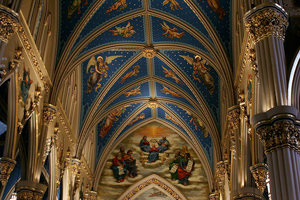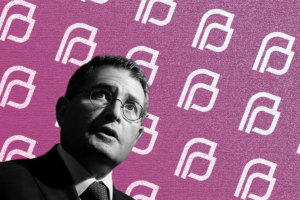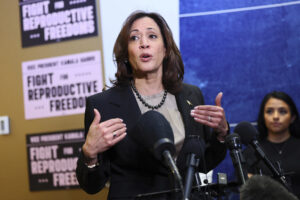The Stakes at Notre Dame
You have heard the expression "more Catholic than the pope." We now know that the reaction of right-wing Catholics to Notre Dame's invitation to President Obama falls into this category.
You have heard the expression “more Catholic than the pope.” We now know that the reaction of right-wing Catholics to Notre Dame’s invitation to President Obama falls into this category.
To the dismay of many conservatives, the Vatican’s own newspaper, L’Osservatore Romano, has offered what one anti-abortion Catholic blog called “a surprisingly positive assessment of the new president’s approach to life issues” — so positive, in fact, that a spokesman for the National Right to Life Committee was moved to criticize Pope Benedict XVI’s daily.
The Vatican newspaper offered its analysis at a time when Catholic liberals and conservatives are battling fiercely over Notre Dame’s decision to invite the president as this year’s commencement speaker and to grant him an honorary degree. The article will strengthen the liberal claim that the Catholic right’s over-the-top response is rooted at least as much in Republican and conservative politics as in concern over the abortion question.
The April 29 essay by Giuseppe Fiorentino, L’Osservatore’s frequent foreign affairs contributor, painted Obama as a moderate on many fronts. “Some have accused him of practicing excessive statism,” Fiorentino wrote, “if not even of making the country drift toward socialism.” But “a calmer analysis,” he said, suggests that Obama “has moved with caution.” (I rely here on a translation of the article posted Wednesday on the Vatican’s official Web site.)
On abortion and the other life issues, the article concluded that Obama “does not seem to have established the radical changes that he had aired.”
In loosening the rules on federal funding of stem-cell research, the paper noted, Obama did not go as far as many in the anti-abortion movement feared he would. “The new guidelines regarding embryonic stem cell research do not in fact follow the prospected change of route laid out months ago,” Fiorentino wrote. “They do not allow for the creation of new embryos for research or therapy purposes, for cloning or reproductive ends; and federal funds can only be used for experimentation with surplus embryos.”
Then came a carefully worded sentence declaring that “these measures do not eliminate the reasons for criticism in the face of unacceptable forms of bioengineering that work against the embryo’s human identity, but the new regulations are less permissive than expected.”
This restrained view contrasts with charges that Obama is the “most radical pro-abortion president in history,” words used earlier this year on the Christian Coalition’s Web site. During the campaign, Robert P. George, a Princeton professor who is a leading Catholic conservative intellectual, called Obama “the most extreme pro-abortion candidate ever to seek the office of president of the United States.”
The consternation on the right over the Vatican article was immediate. Douglas Johnson, legislative director for the National Right to Life Committee in the U.S., told LifeSiteNews.com that L’Osservatore’s assessment was “not helpful” and that “there’s nothing middle of the road about the substantive policies that this administration is pursuing on life issues.”
Rank-and-file Catholics do not share in the conservatives’ gloominess. A recent Pew Research Center poll found that two-thirds of Catholics approved of Obama’s performance in office. Pew also reported that 50 percent of Catholics thought Notre Dame was right to invite Obama, while only 28 percent said the invitation was wrong. Even among Catholics who attend Mass at least once a week, opinion was divided evenly, with 39 percent supporting and 39 percent opposing the invitation.
Largely lost in the Notre Dame furor is the extent to which the ferocity on the Catholic right has emboldened moderate and liberal Catholics to fight back.
The current issue of America magazine, published by the Jesuits, includes a sharply worded editorial criticizing the “divisive effects of the new American sectarians” which “have not escaped the notice of the Vatican.”
“Their highly partisan political edge has become a matter of concern,” the editors write. “That they never demonstrate the same high dudgeon at the compromises, unfulfilled promises and policy disagreements with Republican politicians as with Democratic ones is plain for all to see. It is time to call this one-sided denunciation by its proper name: political partisanship.”
And so when Obama rises to speak at Notre Dame on May 17, the stakes will be highest for moderate and liberal Catholics who insist the president is seeking common ground on the moment’s most contentious ethical issues.
It is likely to be his most consequential intervention in the debate over religion’s role in American politics. In accepting the invitation, Obama has assumed a large responsibility that he should not try to escape.
E.J. Dionne’s e-mail address is ejdionne(at)washpost.com.
© 2009, Washington Post Writers Group
Your support matters…Independent journalism is under threat and overshadowed by heavily funded mainstream media.
You can help level the playing field. Become a member.
Your tax-deductible contribution keeps us digging beneath the headlines to give you thought-provoking, investigative reporting and analysis that unearths what's really happening- without compromise.
Give today to support our courageous, independent journalists.








You need to be a supporter to comment.
There are currently no responses to this article.
Be the first to respond.